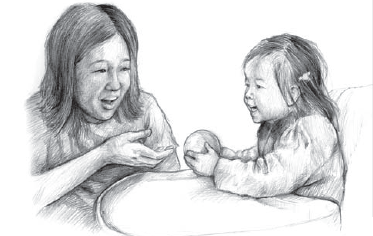Child Behavior
What Is Your One-Year-Old Telling You?
Print, Share, or View Spanish version of this article
 Language begins long before the first spoken words. Your child starts “telling” you things during the first year of life. Your child may say things with looks, smiles, movements, or sounds. These early messages are very important.
Language begins long before the first spoken words. Your child starts “telling” you things during the first year of life. Your child may say things with looks, smiles, movements, or sounds. These early messages are very important.
Talk with your child’s doctor about how your child is growing and learning. Always tell the doctor right away if you are worried about something.
What’s Normal?
Children usually can do certain things at certain ages.
By 12 months your baby should:
-
Look for and find where sounds are coming from.
-
Know his or her name most of the time when you call it.
-
Wave goodbye.
-
Look where you point when you say, “Look at the _____.”
-
Take turns “talking” with you. (Your child listens when you speak, then babbles when you stop.)
-
Say “da-da” to Dad and “ma-ma” to Mom and at least one other word.
-
Point to things he or she wants.
Between 12 and 24 months your baby should:
-
Follow simple commands, like “Pick up your toy.” (You may need to point to the toy at first.)
-
Get things from another room when asked.
-
Point to a few body parts when asked.
-
Point to things or events to get you to look at them.
-
Bring things to show you.
-
Name a few common objects and pictures when asked.
-
Enjoy pretending, like having a tea party.
By 24 months your toddler should:
-
Point to many body parts and common things when asked.
-
Point to some pictures in books when asked.
-
Follow 2-step commands. (For example, “Get your toy and put it in the backpack.”)
-
Say about 50 to 100 words.
-
Say many 2-word phrases like “Daddy go,” “doll mine,” and “all gone.”
Signs of a Problem
Babies express themselves in many ways. Talk with the doctor if your child:
-
Doesn’t use any words by 18 months.
-
Doesn’t put 2 words in a phrase by 24 months.
-
Doesn’t cuddle like other babies.
-
Doesn’t return a happy smile back to you.
-
Doesn’t seem to notice if you are in the room.
-
Doesn’t show you things to look at together.
-
Doesn’t respond when you call his or her name but seems to hear other sounds.
-
Prefers to play alone. Seems to “tune others out.”
-
Doesn’t seem interested in toys, but likes to play with other things in the house.
What to Do If Your Child Isn’t Talking
Many children learn to talk late. One in 5 children is slow to talk or use words.
The problem may go away on its own. Or your child may need a little extra help. Sometimes speech therapy
Late talking also may be a sign of something more serious. Your child may have a hearing loss, autism
What the Doctor May Do
After you talk about your concerns, your child’s doctor may:
-
Ask you some questions about your child.
-
Check how your child is developing.
-
Order a hearing test.
-
Refer you to a speech therapist for testing. The therapist will check how well your child expresses himself or herself. The therapist will also check how well your child understands words and gestures.
-
Refer you to a developmental-behavioral specialist
* . This specialist will check all areas of your child’s development.
It’s OK to say you are still concerned if the doctor says your child will “catch up in time.” You can also ask for a referral
Programs That Can Help
Your child’s doctor may also refer you to a developmental or school program. These programs help children with different kinds of growing and learning problems. The program staff may want to do their own tests with your child.
If your child is younger than 3 years, the doctor may refer you to an Early Intervention Program (EIP). Or you can contact the program yourself. The government pays for these programs. EIPs help children with delays and other problems.
If your child qualifies for help, EIP staff will work with you to make a plan. This is called an Individualized Family Service Plan, or IFSP. It may include training and support for you as well as therapy, special equipment, and other services for your child. After 3 years of age, the EIP staff will refer your child to the local school district.
Remember
Follow your instincts as a parent. Ask for more testing or a referral for your child if you are still worried.
Tell your child’s doctor if your child seems slow or shows any of the “Signs of a Problem” on the left. Also, tell the doctor if your baby stops talking or doing things he or she used to do.



